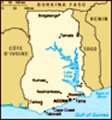Advertisement
Published: July 22nd 2010

 Ghana flag...
Ghana flag...
on a table top.July ?
When you stare at bamboo and palm bushes long enough you see the weave of baskets and fabric, and you finally realize where some of those amazing patterns came from. Ghanaians work hard but they also do a lot of sitting. I think they see more of life’s intricate designs than we do. I believe it’s their nature to observe, inhale and share when the time is right.
I haven’t been here long enough to not get frustrated by their just-right time way of living, but when it shows up in their art and their language I understand it just a little bit. We need to learn to sit, stare and listen more.
That said they also live very much in the now. We know their traditional dances and music, which is still very much a part of their lives, tell stories of the past, but it seems that the working class do not spend too much time talking or singing about their own lineage. Mr. Okoko, our bus driver, said sharing the story of your lineage is more important to royal lines than others.
It’s more about surviving today and getting your children educated
to build for a better future, he said. But, there are stories. It is also part of Akan culture to not expose too much --- you are not supposed to tell ‘where people are.’ Perhaps, as welcoming as folk are, they have decided that some things are just not meant to be shared, which makes sense to me. A lot of sharing went on in the past, and Obrini proved that we’re real good at taking.
A few days ago we hiked through a village to interview the town’s archivist and historian, on top of an ancient fort/slave castle (the pictures in yesterday’s post are from there). To get there we drove through rubber plantations --- they attach black cones to the trees, which overflow with white foam. We were told they make latex from that foam --- so I can now honestly say I know where condoms are conceived.
Brown water is everywhere, which means our road was muddy with pond-sized puddles. Sure enough we got stuck in one, but within minutes there were people to help get us out. Some of us (not me, I got pushed back into the bus for weight --- obviously palm

 us
us
waiting for questionsoil doesn’t agree with me) got out to push, and those folk got a whole lot of mud on them.
The hike to the castle, named Fort Gross-Fredericksburg, was like a scene from Indiana Jones. You slosh through mud and jungle, wave at working villagers, sweat and climb your way to an oasis that overlooks another oasis. Unbelievable. We even had a run in with bats when we entered one of the chambers. I’ve read that backpackers hike and camp here for a small fee. It is also considered the most luxurious Ghana castle with its arched rooms and windows.
We were told about the castle’s beginning and its impact on the village. Like I wrote yesterday, at first it wasn’t so bad. The Germans came for ivory, gold, and all the other wealth the country holds (thanks to what they heard from the Portuguese who built along much of Cape Coast). Since slavery was a practice among warring tribes, it didn’t seem unusual to traffic strong men as well. The difference was among tribes, slaves could find their way to freedom again. They knew they would suffer, but there was always a chance their ‘debt’ would be

 Students!
Students!
having fun with us.paid. Plus, local slaves could also earn wages --- not as much as non slaves, but an income is better than total dependence on your owners. And, they were seen as human beings, not some sub species that may have mattered as much as livestock.
The Germans brought three villagers back to their land to teach them the language and the German way of life (two came back, one died), so that when they brought them back to the village, the locals would know how to trade with Germany. I sense that it also had something to do with a better way to exploit and get cheaper access to goods, but my ancestors did at least keep their word and not enslave women or children.
I couldn’t hear how the Germans lost the fort to the Dutch, but according to the interviews things changed, and slavery became a much bigger commodity --- the best of the best regardless of age or gender was free game.
When asked about what today’s villagers think about African Americans, we were told emotions are mixed. On the one hand they see them as outsiders --- because they no longer know the ways of Ghana, or in many cases even what part of Africa they come from --- on the other hand they welcome them back home. In some cases they are a little envious because of our wealth, in others they feel sorry for what has been lost.
One woman told Delores that African-Americans come here searching for their roots while Africans wonder where their lost ones have gone.
The fabric that makes up today’s global societies is crudely stitched from torn seams. I don’t even pretend to understand it all, but it is where we are now. I wonder if we can ever figure out a way to turn it into the gold we so like to steal from others, and in essence ourselves.
After our interviews, we drove to a government high school in another village --- I’m sorry the names blend together so quickly, and I don’t always have a pen handy to write it all down. The campus is a series of yellow, two-story concrete buildings. There are around 1,000 students who attend classes from around 8 a.m. to 2:40. 45 to 60 students fill each classroom, and resources are so much less than what we have.
We had an opportunity to talk to the faculty, and while I have it soooo, sooooo much better, our challenges are similar --- trying to reach all of your students when there are so many to reach (um, I didn’t share that my class load is half their’s), dealing with political battles and mandates, getting kids to read and write more, that sort of thing.
One of the misconceptions we might make at home is that because the schools are poor that the teachers are uneducated. They have a pretty intense master’s program that they go through at education universities, like Winneba (the one we visited). What is done in the Ghana classroom with so much less than what U.S. teachers have is actually quite amazing --- barely short of a miracle. I wouldn’t mind a chance to teach here --- apparently there’s a shortage of qualified teachers at all levels. The problem for me is money. I could not pay my U.S. bills with a Ghana paycheck (not even at the university level)--- ah, the reality of being a slave to debt.
After we talked with faculty members trying to finish off their day we became the cause for an assembly --- students stayed after school for this. My eyes welled when the entire student body stood and sang to us.
We each stood and introduced ourselves. I don’t even remember what I said, but I can tell you Delores was a hit. The kids loved her and Charles --- whose animated self turned it into a Go Ghana pep rally, which was really cool. The kids then got their turn to ask us questions, and they pretty much asked the same types of questions my students would have. I’ll regret typing this, but I miss my students too. They will wear me out before the end of first semester, but I am a lucky soul to watch their writing go from this to that.
Maybe if I spend a little more time just watching them I will see their words weave that better future we all hope for.
Advertisement
Tot: 0.225s; Tpl: 0.013s; cc: 5; qc: 46; dbt: 0.143s; 1; m:domysql w:travelblog (10.17.0.13); sld: 2;
; mem: 1.1mb








maryanne Stahl
non-member comment
bettina, this brought tears to my eyes. xxx